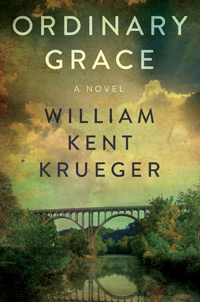I’ve known Kent since he invited himself to the store when his first novel, Iron Lake, was published in 1998. As long as I’ve known him, I’ve been a fan of his work. His new novel, Ordinary Grace, is an extraordinary leap – a deepening of previous work. It was a pure delight to read.
 Q: One of the things I found most interesting about this book was the voice. While it’s set in 1961, it doesn’t in any way seem like a period piece or an historical novel. How personal to you are the memories of 1961 in small town Minnesota?
Q: One of the things I found most interesting about this book was the voice. While it’s set in 1961, it doesn’t in any way seem like a period piece or an historical novel. How personal to you are the memories of 1961 in small town Minnesota?
A: One of the main motivations for writing Ordinary Grace was the opportunity to explore memories, emotions, and experiences out of my own life when I was, essentially, the age of the story’s narrator, thirteen-year-old Frank Drum. For boys—maybe it’s the same for girls, I don’t know—that period in our lives is an important threshold. We’re about to step out of adolescence and into manhood, and the crossing over is sharp, significant, and full of deep emotion. Everything before seemed simple, and, afterward, everything so terribly complex. Growing up, I lived in many small towns, and I wanted to capture the essence of those places, both for the benefit of the reader and, I suppose, to indulge my weakness for nostalgia. So, yes, I mined a lot of my own background for this novel.
Q: The narrative feels more like a fable or a remembered dream. How did you accomplish this?
A: My own feeling is that this is the result of the way the narrative is constructed. It’s told by Frank forty years after the events took place, but the perceptions and the way in which occurrences, people, places, and emotions are described is often in the moment and from the point of view of a thirteen-year-old kid. So the voice is both current and past. It’s like a recollection that drifts between dream and reality.
Q:I think most serious writers have certain themes they are working through in almost every book. I think in all your Cork books the themes you seem to be interested in are kinship and loyalty and what those things mean. Any thoughts on that?
A: Yeah, I have a few. I write pretty close to the bone. In my series, many of Cork’s concerns and considerations are my own. So, Cork believes in justice; I believe profoundly in the necessity for justice in this world. Cork believes that you make commitments, and, come hell or high water, you stand by those commitments. That’s pretty much what I believe. Cork believes that in this life, family is the most significant relationship you’re likely to experience. Ditto for me. So what interests me in the stories is the struggle to hold to these ideals in a world that seems often bent on either forcing or seducing you from them.
Q: As this book comes after many Cork O’Connor novels, I am wondering if that writing journey led you to write this book? Do you feel like it was intensifying some of the themes you’ve written about in the past?
A: I think I had a lot to learn about storytelling before I was ready to take on the challenge of writing a novel like Ordinary Grace. It seems a rather simply told tale, but that simplicity hides a lot of depth, complexity, and meaning. (At least, I hope it does.) And that point of view I mentioned earlier, the voice that is of the moment and, at the same time, of the past, is a tricky thing to pull off. I’ve learned a lot about storytelling with the Cork novels and a lot about myself as a storyteller. I think I was aching to write this kind of book, and finally had to do it. Ordinary Grace allowed me to speak more directly to issues and themes that have been a part of the Cork O’Connor stories but seldom front and center, things like faith and the spiritual journey. Having done it and believing that I did an all right job of it, I’m eager to try this kind of story again.
 Q: At the center of this book is a minister. Many of your books have a spiritual quality, and it’s not a pounding it into your head type deal, it’s part of the fabric of your storytelling. While you often write about very grisly happenings – and there’s some grim occurrences in this one, as well – the ultimate outlook at the end of every novel is a hopeful or optimistic one. I think it’s a quality many of your readers cherish. Anyway this is a long way of asking why you chose a minister as the central character?
Q: At the center of this book is a minister. Many of your books have a spiritual quality, and it’s not a pounding it into your head type deal, it’s part of the fabric of your storytelling. While you often write about very grisly happenings – and there’s some grim occurrences in this one, as well – the ultimate outlook at the end of every novel is a hopeful or optimistic one. I think it’s a quality many of your readers cherish. Anyway this is a long way of asking why you chose a minister as the central character?
A: My first thought, when mulling over the story that became Ordinary Grace, was to make Nathan Drum a high school English teacher in this small town, because that was my father and that was an experience I knew well. I wanted to write about a family that, in a small community, is watched carefully, and that’s definitely a teacher’s family. But I’ve always wanted to talk about faith, really about the whole consideration of God, and so the ministry became a better choice of profession. Over the years, I’ve known a lot of PKs (preacher’s kids), and I’ve heard stories of the pressures they were under and of their rebellions. I thought that kind of kid would make a compelling narrator. Also, I realized early on that when the death in the family occurs, if Nathan Drum is a minister, the tragedy would be such a tremendous challenge to his faith that exploring his reaction—and the reactions of each member of the family—would be a fascinating journey for me as a writer. Was it ever!
Q: As I was reading this for the second time, I was wondering about the structure of this book. You foreshadow what will happen, but the central death doesn’t occur until almost exactly halfway through the novel, making the story a stark “before” and “after”. Was this structure intentional, or did it happen organically while you were writing it?
A: Although the death provides a compelling mystery element to the story (I am, after all, known as a mystery writer), this was not intended to be a mystery, as such. It was, from its earliest beginnings, going to be a story about a family in a small town who experience something awful. It was going to be about love and struggle and faith and hope. I knew that eventually it would deal with a tragic death that turns out to be a murder and challenges a family, and, in a way, a whole community, to reconsider their values. So the first part of the book was intended to draw the reader into an engagement with the Drum family and the town of New Bremmen, so that when the tragedy occurs, if I’d done my job correctly, it would be an emotional blow not only to the characters in the story, but to readers as well. However, because I didn’t really outline this story, as I usually do with my Cork O’Connor novels, I felt my way along with the actual events. So, to a degree, I suppose, things did happen organically.
Q: Did this novel refresh your palate? Did it make you feel ready to dive back into the Cork novels?
A: These days, I never have to refresh myself in order to dive into a Cork O’Connor story. I love Cork and his family and Tamarack County, and I’m not at all tired of writing the series. I promised myself a long time ago that when I did grow weary of it, I would end the series, because I never want to offer readers a story in which I haven’t invested my whole heart. But if that time does ever come, the way I’m feeling right now, it’s still a long way down the road.
Q: What’s next for you as a writer?
A: I have another in the Cork O’Connor series due out at the end of August. It’s called Tamarack County, and I’m really pleased with it. That concludes my current contract with my publisher, but we’ve just negotiated a new three-book contract that includes two more in the Cork O’Connor series and another stand alone. I’m at work on the stand alone, a novel titled This Tender Land, which is, in a way, a companion to Ordinary Grace. It’s also set in southern Minnesota and in an earlier time, roughly the late nineteen-fifties. It’s the story of a wealthy farmer found dead in the Alabaster River and of the secrets, long buried in the soil of Black Earth County, that come to light during the investigation of his death. Thematically, it’s an exploration of the extremes we’re willing to go to in order to hold onto the things—people, land, ideals—that we cherish. I’m having a ball with it.